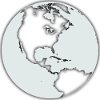Article
Geographically, Tunisia contains the eastern end of the Atlas Mountains, and the northern reaches of the Sahara desert. Much of the rest of the country's land is fertile soil. Its 1,300 kilometres (810 miles) of coastline include the African conjunction of the western and eastern parts of the Mediterranean Basin and, by means of the Sicilian Strait and Sardinian Channel, feature the African mainland's second and third nearest points to Europe after Gibraltar.
Tunisia is a unitary semi-presidential representative democratic republic. It is considered to be the only full democracy in the Arab World.[21][22] It has a high human development index.[17] It has an association agreement with the European Union; is a member of La Francophonie, the Union for the Mediterranean, the Common Market for Eastern and Southern Africa, the Arab Maghreb Union, the Arab League, the OIC, the Greater Arab Free Trade Area, the Community of Sahel-Saharan States, the African Union, the Non-Aligned Movement, the Group of 77; and has obtained the status of major non-NATO ally of the United States. In addition, Tunisia is also a member state of the United Nations and a state party to the Rome Statute of the International Criminal Court. Close relations with Europe – in particular with France[23] and with Italy[24][25] – have been forged through economic cooperation, privatisation and industrial modernization.
In ancient times, Tunisia was primarily inhabited by Berbers. Phoenician immigration began in the 12th century BC; these immigrants founded Carthage. A major mercantile power and a military rival of the Roman Republic, Carthage was defeated by the Romans in 146 BC. The Romans, who would occupy Tunisia for most of the next eight hundred years, introduced Christianity and left architectural legacies like the El Djem amphitheater. After several attempts starting in 647, the Muslims conquered the whole of Tunisia by 697, followed by the Ottoman Empire between 1534 and 1574. The Ottomans held sway for over three hundred years. The French colonization of Tunisia occurred in 1881. Tunisia gained independence with Habib Bourguiba and declared the Tunisian Republic in 1957. In 2011, the Tunisian Revolution resulted in the overthrow of President Zine El Abidine Ben Ali, followed by parliamentary elections. The country voted for parliament again on 26 October 2014,[26] and for President on 23 November 2014.[27] Tunisia is situated on the Mediterranean coast of Northwest Africa, midway between the Atlantic Ocean and the Nile Delta. It is bordered by Algeria on the west and southwest and Libya on the south east. It lies between latitudes 30° and 38°N, and longitudes 7° and 12°E. An abrupt southward turn of the Mediterranean coast in northern Tunisia gives the country two distinctive Mediterranean coasts, west-east in the north, and north-south in the east.
Though it is relatively small in size, Tunisia has great environmental diversity due to its north-south extent. Its east-west extent is limited. Differences in Tunisia, like the rest of the Maghreb, are largely north-south environmental differences defined by sharply decreasing rainfall southward from any point. The Dorsal, the eastern extension of the Atlas Mountains, runs across Tunisia in a northeasterly direction from the Algerian border in the west to the Cape Bon peninsula in the east. North of the Dorsal is the Tell, a region characterized by low, rolling hills and plains, again an extension of mountains to the west in Algeria. In the Khroumerie, the northwestern corner of the Tunisian Tell, elevations reach 1,050 metres (3,440 ft) and snow occurs in winter.
The Sahel, a broadening coastal plain along Tunisia's eastern Mediterranean coast, is among the world's premier areas of olive cultivation. Inland from the Sahel, between the Dorsal and a range of hills south of Gafsa, are the Steppes. Much of the southern region is semi-arid and desert.
Tunisia has a coastline 1,148 kilometres (713 mi) long. In maritime terms, the country claims a contiguous zone of 24 nautical miles (44.4 km; 27.6 mi), and a territorial sea of 12 nautical miles (22.2 km; 13.8 mi).[94]
Climate
Tunisia's climate is Mediterranean in the north, with mild rainy winters and hot, dry summers.[95] The south of the country is desert. The terrain in the north is mountainous, which, moving south, gives way to a hot, dry central plain. The south is semiarid, and merges into the Sahara. A series of salt lakes, known as chotts or shatts, lie in an east-west line at the northern edge of the Sahara, extending from the Gulf of Gabes into Algeria. The lowest point is Chott el Djerid at 17 metres (56 ft) below sea level and the highest is Jebel ech Chambi at 1,544 metres (5,066 ft).[96] Tunisia is a representative democracy and a republic with a president serving as head of state, prime minister as head of government, a unicameral parliament, and a civil law court system. The Constitution of Tunisia, adopted 26 January 2014, guarantees rights for women and states that the President's religion "shall be Islam". In October 2014 Tunisia held its first elections under the new constitution following the Arab Spring.[98]
The number of legalized political parties in Tunisia has grown considerably since the revolution. There are now over 100 legal parties, including several that existed under the former regime. During the rule of Ben Ali, only three functioned as independent opposition parties: the PDP, FDTL, and Tajdid. While some older parties are well-established and can draw on previous party structures, many of the 100-plus parties extant as of February 2012 are small.[99]
Rare for the Arab world, women held more than 20% of seats in the country's pre-revolution bicameral parliament.[100] In the 2011 constituent assembly, women held between 24% and 31% of all seats.[101][102]
Tunisia is included in the European Union's European Neighbourhood Policy (ENP), which aims at bringing the EU and its neighbours closer. On 23 November 2014 Tunisia held its first Presidential Election following the Arab Spring in 2011.[103]
The Tunisian legal system is heavily influenced by French civil law, while the Law of Personal Status is based on Islamic law.[104] Sharia courts were abolished in 1956.[104]
A Code of Personal Status was adopted shortly after independence in 1956, which, among other things, gave women full legal status (allowing them to run and own businesses, have bank accounts, and seek passports under their own authority). The code outlawed the practices of polygamy and repudiation and a husband's right to unilaterally divorce his wife.[105] Further reforms in 1993 included a provision to allow Tunisian women to transmit citizenship even if they are married to a foreigner and living abroad.[106] The Law of Personal Status is applied to all Tunisians regardless of their religion.[104] The Code of Personal Status remains one of the most progressive civil codes in North Africa and the Muslim world.[107]
Human rights
Main article: Human rights in Tunisia
After the revolution, a number of Salafist groups emerged and in some occasions have violently repressed artistic expression that is viewed to be hostile to Islam.[108]
Since the revolution, some non-governmental organizations have reconstituted themselves and hundreds of new ones have emerged. For instance, the Tunisian Human Rights League, the first human rights organization in Africa and the Arab world, operated under restrictions and state intrusion for over half of its existence, but is now free to operate. Some independent organizations, such as the Tunisian Association of Democratic Women, the Association of Tunisian Women for Research and Development, and the Bar Association also remain active.[99]
Homosexuality is illegal in Tunisia and can be punished by up to three years in prison.[109] On December 7, 2016, two Tunisian men were arrested on suspicion of homosexual activity in Sousse.[110] According to 2013 survey by the Pew Research Center, 94% of Tunisians believe that homosexuality should not be accepted by society.[111]
The Tunisian regime has been criticised[by whom?] for its policy on recreational drug use, for instance automatic 1-year prison sentences for consuming cannabis. Prisons are crowded and drug offenders represent nearly a third of the prison population.[112]
In 2017, Tunisia became the first Arab country to outlaw domestic violence against women, which was previously not a crime.[113] Also, the law allowing rapists to escape punishment by marrying the victim was abolished.[113] According to Human Rights Watch, 47% of Tunisian women have been subject to domestic violence.[114][115]
Military
Main article: Tunisian Armed Forces
Tunisian Armed Forces
As of 2008, Tunisia had an army of 27,000 personnel equipped with 84 main battle tanks and 48 light tanks. The navy had 4,800 personnel operating 25 patrol boats and 6 other craft. The Tunisian Air Force has 154 aircraft and 4 UAVs. Paramilitary forces consisted of a 12,000-member national guard.[116] Tunisia's military spending was 1.6% of GDP as of 2006. The army is responsible for national defence and also internal security. Tunisia has participated in peacekeeping efforts in the DROC and Ethiopia/Eritrea.[117] United Nations peacekeeping deployments for the Tunisian armed forces have been in Cambodia (UNTAC)
Previous article:
rest in peace (7 years ago)
Next article:
wake up (7 years ago)
About the game:

USA as a world power? In E-Sim it is possible!
In E-Sim we have a huge, living world, which is a mirror copy of the Earth. Well, maybe not completely mirrored, because the balance of power in this virtual world looks a bit different than in real life. In E-Sim, USA does not have to be a world superpower, It can be efficiently managed as a much smaller country that has entrepreneurial citizens that support it's foundation. Everything depends on the players themselves and how they decide to shape the political map of the game.
Work for the good of your country and see it rise to an empire.
Activities in this game are divided into several modules. First is the economy as a citizen in a country of your choice you must work to earn money, which you will get to spend for example, on food or purchase of weapons which are critical for your progress as a fighter. You will work in either private companies which are owned by players or government companies which are owned by the state. After progressing in the game you will finally get the opportunity to set up your own business and hire other players. If it prospers, we can even change it into a joint-stock company and enter the stock market and get even more money in this way.
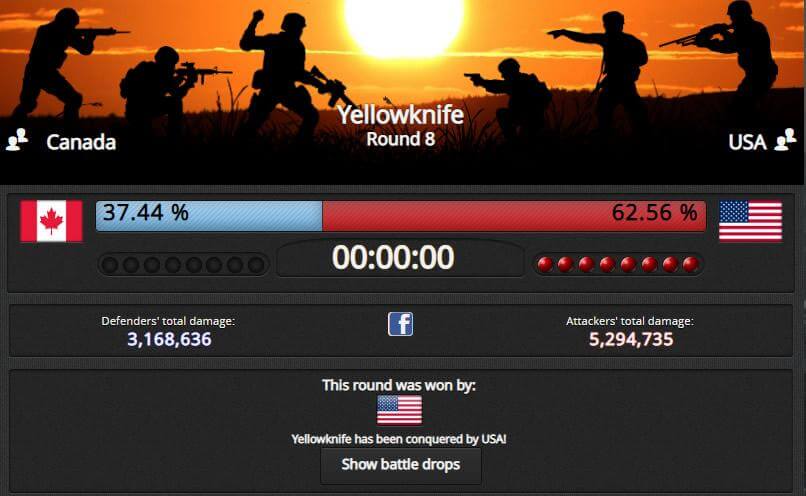
In E-Sim, international wars are nothing out of the ordinary.
Become an influential politician.
The second module is a politics. Just like in real life politics in E-Sim are an extremely powerful tool that can be used for your own purposes. From time to time there are elections in the game in which you will not only vote, but also have the ability to run for the head of the party you're in. You can also apply for congress, where once elected you will be given the right to vote on laws proposed by your fellow congress members or your president and propose laws yourself. Voting on laws is important for your country as it can shape the lives of those around you. You can also try to become the head of a given party, and even take part in presidential elections and decide on the shape of the foreign policy of a given state (for example, who to declare war on). Career in politics is obviously not easy and in order to succeed in it, you have to have a good plan and compete for the votes of voters.
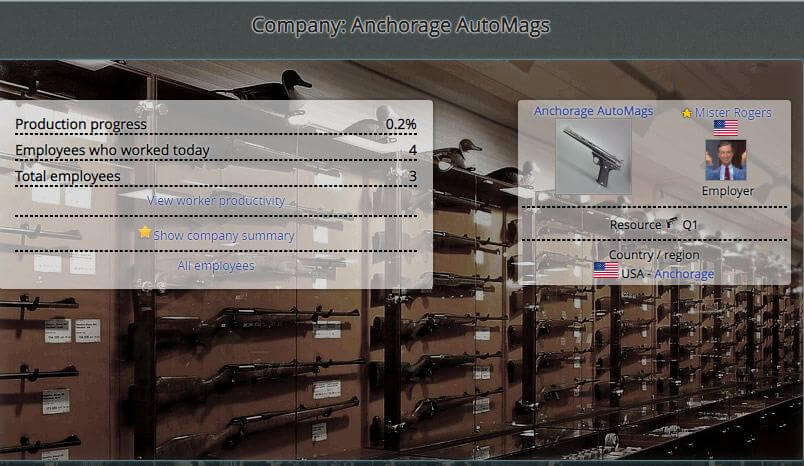
You can go bankrupt or become a rich man while playing the stock market.
The international war.
The last and probably the most important module is military. In E-Sim, countries are constantly fighting each other for control over territories which in return grant them access to more valuable raw materials. For this purpose, they form alliances, they fight international wars, but they also have to deal with, for example, uprisings in conquered countries or civil wars, which may explode on their territory. You can also take part in these clashes, although you are also given the opportunity to lead a life as a pacifist who focuses on other activities in the game (for example, running a successful newspaper or selling products).
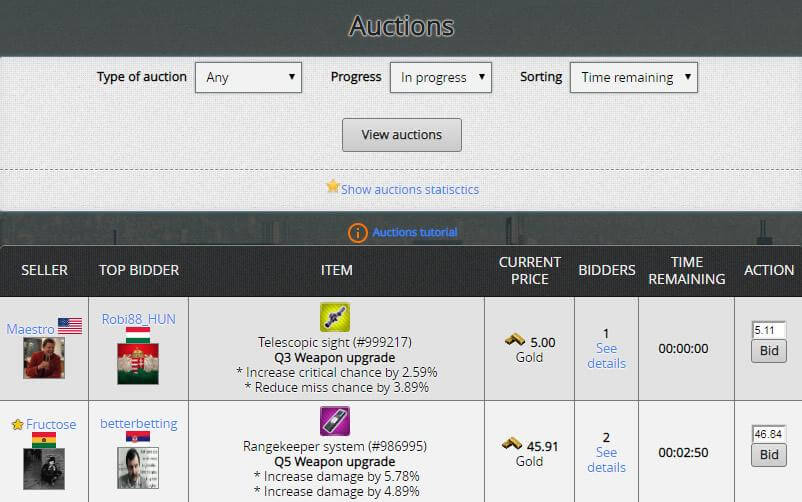
At the auction you can sell or buy your dream inventory.
E-Sim is a unique browser game. It's creators ensured realistic representation of the mechanisms present in the real world and gave all power to the players who shape the image of the virtual Earth according to their own. So come and join them and help your country achieve its full potential.
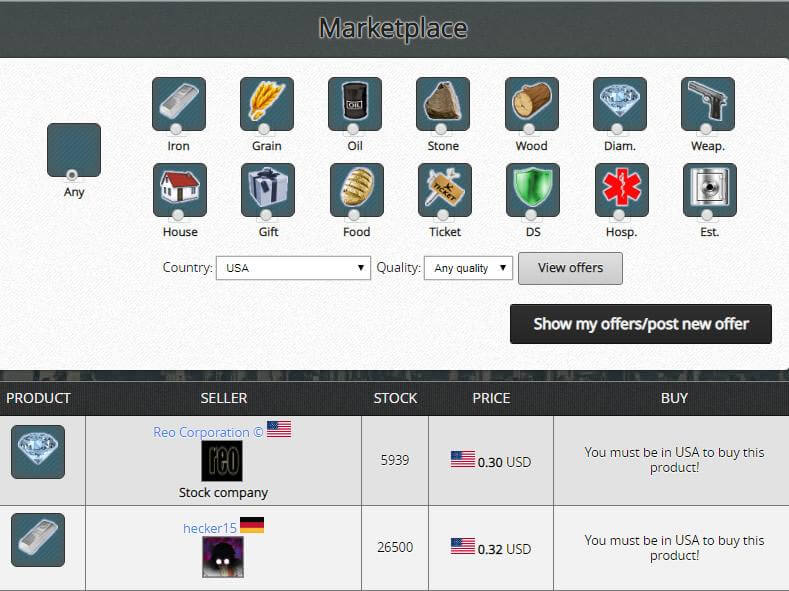
Invest, produce and sell - be an entrepreneur in E-Sim.
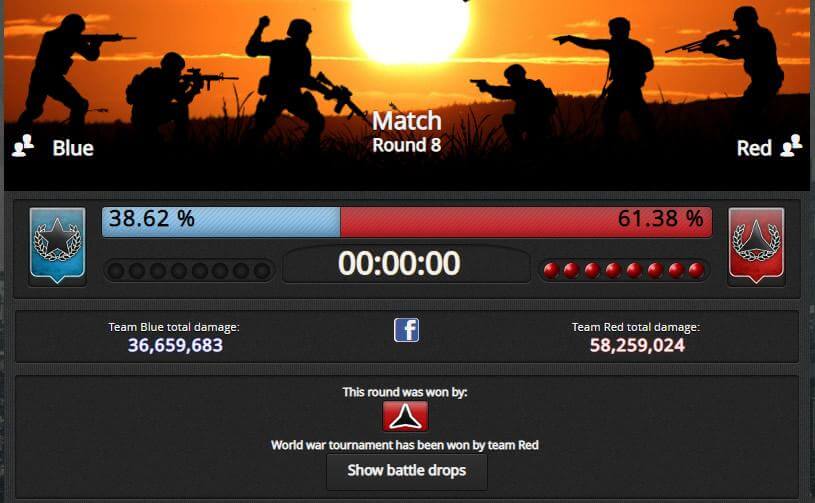
Take part in numerous events for the E-Sim community.
